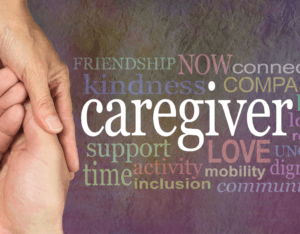If you are reading this article, chances are you are a caregiver and you are stressed out! I’ve been there. Being a caregiver is one of the most selfless and rewarding roles one can undertake, but it is also one of the most challenging. Whether caring for an aging parent, a chronically ill spouse, or a child with special needs, caregivers face immense physical, emotional, and mental demands. It’s time to take care of you! Below you will find my 12 steps to reduce caregiver stress.
To help determine if you are experiencing caregiver stress, start by taking the caregiver stress burnout quiz. By understanding the signs of stress and taking proactive steps to manage it, you can improve your own well-being and continue to provide the best possible care for your loved one. In this article, I’ll share my twelve practical steps to help reduce caregiver stress and maintain a healthier, more balanced life.
How Does Stress Show Up?

I’m going to lay it out straight: caregiver stress is a real and often overlooked issue that deserves our attention. It creeps in silently, manifesting through mood swings, sleep problems, and a host of other health issues. But what exactly triggers it? From the constant worries about the health of a loved one to the financial pressures and the sheer physical demands of caregiving, the triggers are as varied as they are taxing.
For me, it felt like a vicious cycle. The physical and emotional stress of caring for my mom while balancing work felt overwhelming. Then, add on the guilt of being stressed and that created more stress.
Warning signs of stress can be subtle or glaring. Changes in behavior, feelings of burnout, anxiety, depression, irritability, and even physical symptoms like headaches or stomach issues could all point towards stress. It’s a delicate balancing act, recognizing these signs in yourself while juggling caregiving duties.
Chronic caregiver stress can lead to serious health risks like high blood pressure, heart disease, and a weakened immune system. It can even escalate into caregiver burnout, a state where you feel emotionally depleted and unable to cope. That’s why it’s vital to acknowledge what you’re experiencing; it’s the first step towards managing stress effectively.
This is where you need to start taking action. Just take one step at a time. Try one of the self-care strategies I discuss below and keep adding on until they become part of your daily routine. That’s what I did. You don’t need to try them all at once. Experiment with them and customize them so that they fit into your daily routine.
12 Steps to Reduce Caregiver Stress
Caring for someone you love isn’t just about meeting their needs; it’s about balancing your own as well. To effectively reduce caregiver stress, implementing self-care strategies is a necessity. Think of self-care as putting on your own oxygen mask before assisting others.
Prioritizing your physical health is a cornerstone of self-care. Let’s talk about how you can easily incorporate these 12 self-care strategies into your daily routine.
1 | Recognize the Signs of Stress:
It’s important for you to be aware of the signs of caregiver stress, such as irritability, fatigue, sleep problems, and feeling overwhelmed. Acknowledging these symptoms is the first step toward managing stress.
2 | Seek Support:
Don’t hesitate to ask for help from family, friends, or support groups. Sharing the caregiving responsibilities can significantly reduce your stress levels. Having a care team is important so the entire caregiving burden does not fall on you. You may want to consider hiring an in-home caregiver to provide some part-time support.
3 | Take Breaks:
Schedule regular breaks throughout the day. Short, frequent breaks can help rejuvenate you and improve your ability to care for your loved one.
4 | Prioritize Self-Care:
Engage in activities that you enjoy and that relax you, such as reading, walking, or hobbies. Taking care of yourself ensures you can better care for others. My self-care activity is running (well, walking now that I’m older). It helps clear my mind and I feel much better physically.
5 | Maintain a Healthy Lifestyle:
Eat a balanced diet, exercise regularly, and get enough sleep. This sounds cliche, but it’s true. I have learned to make healthy choices when I eat and that makes me feel 100% better. A healthy body can better cope with stress.
6 | Practice Mindfulness and Relaxation Techniques:
Techniques such as deep breathing, meditation, or yoga can help reduce stress and improve your mental well-being. I took up transcendental meditation (TM) a couple years ago and it has changed my life. Meditating in the morning changes how I approach the day and I feel so much more relaxed.
7 | Stay Organized:
Use calendars, to-do lists, and apps to keep track of appointments, medications, and daily tasks. Organization can reduce feelings of being overwhelmed. When I can check something off my to-do list, it gives me a feeling of accomplishment.
8 | Set Realistic Goals:
Break tasks into smaller steps and set achievable goals. Accept that you can’t do everything, and it’s okay to ask for help.
9 | Stay Informed:
Educate yourself about your loved one’s condition and the caregiving process. The more you know, the more confident and less stressed you will feel.
10 | Connect with Other Caregivers:
Join a support group, either in person or online. Sharing experiences with others who understand can provide emotional support and practical advice. I had the luxury of having a good friend who was also caring for his mom. We relied on each other for a lot of emotional support.
11 | Utilize Respite Care:
Take advantage of respite care services, which provide temporary relief for primary caregivers. This can be crucial for preventing burnout. I found a place where I could take my mom for a few hours during the day which gave me time to do things. And, it gave her the opportunity to meet and talk with other people.
12 | Seek Professional Help if Needed:
If the stress becomes too overwhelming, consider speaking with a mental health professional. Therapy or counseling can provide you with coping strategies and emotional support. My philosophy is everyone needs a therapist. It can do wonders.
Take Action
Caregiver stress is real. It is a serious issue faced by many people who provide care for loved ones with chronic illnesses, disabilities, or aging-related needs. Recognizing the signs of stress and taking proactive measures to manage it are crucial for maintaining both the caregiver’s and the care recipient’s well-being. By seeking support, prioritizing self-care, staying organized, and utilizing resources like respite care and support groups, caregivers can reduce their stress levels and improve their quality of life. Implementing these twelve practical steps can help caregivers sustain their health and continue providing compassionate and effective care.
Let me know in the comments section below how you are doing with your self-care or if you’ve found other ways of managing your stress.
Here’s a little transparency: Our website contains affiliate links. This means if you click and make a purchase, we may receive a small commission. Don’t worry, there’s no extra cost to you. It’s a simple way you can support our mission to bring you quality content.
Recommended For You

How To Care For A Caregiver
If you are, or have been a caregiver, you know that caregiving is a labor of love. Your work is often performed in the shadows without much recognition. While caregivers …

Home Care Plan Template
What is a Home Care Plan? A care plan is a document that professional caregivers and care providers use to make sure that their clients are receiving the right care and that that their needs are being met in a timely manner. Family caregivers and others who are caring for

Gay and Aging – Going Back In The Closet?
Sally I still remember that day when I met Sally. She had just been released from the hospital after a recent fall and needed help with bathing and basic chores around the house. I owned an in-home senior care agency in Palm Springs, CA and Sally had been referred to

Medical Marijuana For Seniors – No Longer the “Evil Weed”
Doctors across the country are calling for a re-think of current government policies, in terms of allowing medical research on medical cannabis, as elderly patients see dramatic results to treat pain. Most seniors would tell you that smoking marijuana was not on their top 10 list of things to do.

What is Dementia Bingo?
Bingo is a popular and fun activity for many people but it can be extremely overwhelming for someone with dementia or Alzheimer’s. Fortunately, there is a simplified version of this …

How to Stay Safe in the Bathroom – 9 Tips
The bathroom is the least safest room in the house and it is where the majority of falls and accidents occur among older adults. It is estimated that 1/3 of …


